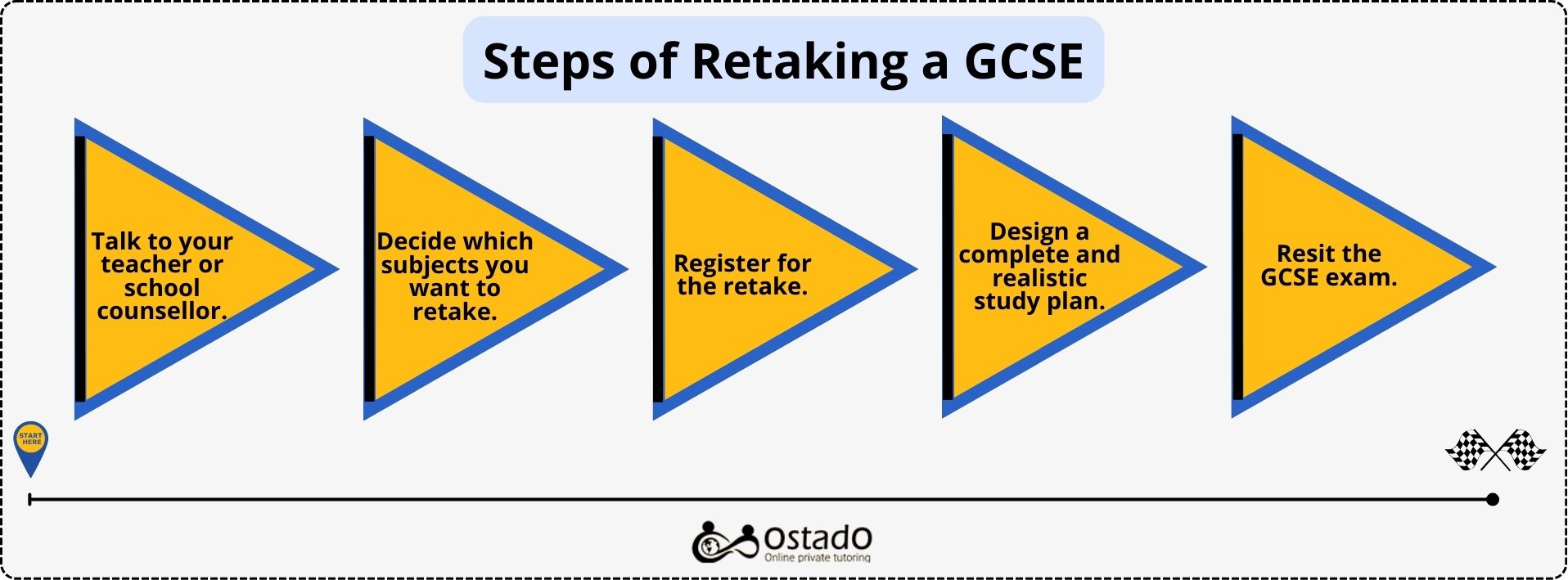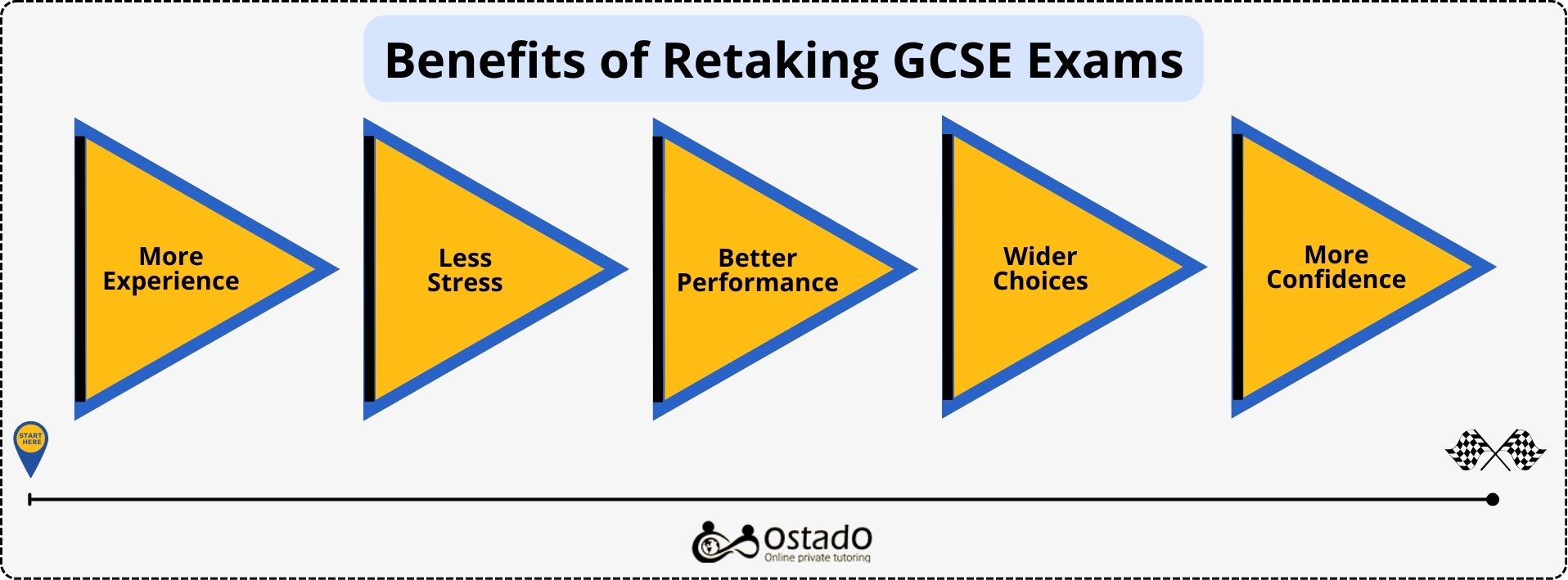According to the statistics, about 32% of students failed their GCSEs across different subjects in 2024. That’s a considerable number! However, failing the GCSEs is not the end of the story for students who fail the exam. They can retake GCSEs next summer. But what steps should GCSE students take to retake GCSE exams? Let’s find out.
Understanding GCSE Resits
GCSE resits are a second chance for students who didn’t acquire the desired results in the first attempt. Of course, when I say “a second chance”, it doesn’t mean you can resit a GCSE for a third or fourth time. You can resit GCSEs as many times as you like.
Also read: What Are Bad GCSE Grades?
The grading scale in England for GCSE exams is from 1 to 9, 9 being the highest grade. In this grading scale, 4 is considered as the standard pass, and if the student fails to get a 4, they fail the GCSE and would have to retake it.
Moreover, when resitting exams, your highest grade will be recognised as your GCSE grade for the respective subject. So, for example, if you get a 5 for maths GCSE in the first attempt, but you get a 4 in your maths resit, 5 will be counted as your GCSE maths grade unless you want to resit maths for a third time.
Do I Have to Retake GCSEs?
Yes and no. Maths GCSE and English language GCSE are compulsory GCSE subjects. Therefore, if you fail them, you have to retake them, and you have to do so until you pass them or turn 18. It’s worth mentioning that English literature is also a compulsory subject in some schools, but that’s the extent of it.
On the other hand, other GCSE subjects are optional, meaning it depends on students’ preferences whether to take them or not. You don’t have to retake these subjects unless your desired academic path is directly related to them. So, if you want to study medicine but fail the GCSE in biology, you must retake it and get an excellent grade.
How Do I Resit My GCSEs?
Fortunately, the procedure is quite simple. However, we strongly recommend that students seek advice from their teachers, school counsellors, academic supporters, or career advisors before deciding to retake the GCSE exams. Click on Help Centre and Knowledge Base for GCSE Students for support.
The next step is to choose the exam centre. Usually, students can resit a GCSE at the school or centre where they took the original exam. But if the school or centre doesn’t support the GCSE, or you’re not eligible for any reason, you can take the test as a private candidate in other centres.
After that, the student should register for the resit. The resit is either in November or May-June. So, make sure to check the GCSE registration deadline in order not to miss the exam resit. You can register for GCSE retakes here.
Can you retake GCSEs online? Click to find out.
Finally, you should devise a revision plan, focusing on your weaknesses and prioritising the subjects and the topics that are more difficult for you. You can download GCSE timetable templates to organise your study schedule and track your progress.
Word of advice: don’t leave things to the last minute; start the revision early enough to cover all topics, preferably six months before the exam date.

The Best Way To Revise for a GCSE Retake
There are several good strategies to get good GCSE grades, but an all-in-one method to revise for GCSEs is working with GCSE tutors. They have extensive knowledge of GCSE subjects, and they know which topics and concepts are difficult for students.
Moreover, they know how to help students overcome these challenges using personalised lessons and frequent feedback. It’s not free, but it’s efficient. So, if you want to study smart, the best way is to get help from someone who knows the way to success: a private tutor.
Benefits of Retaking GCSE Exams
Believe it or not, retaking exams is actually a good thing. It’s your chance to get better grades and outperform yourself.

- Less stress: In a GCSE resit, you already know what’s to happen. This familiarity with the exam session helps you calm down and focus better on the exam.
- Better grades: Experience is the best way to learn something. Now that you’ve already taken the GCSE exam once, you’ve addressed the gaps in your knowledge and worked on your weaknesses in the second attempt, which ultimately leads to higher grades.
- Wider choices: With better grades, you’ll have more doors you can open to your future, either in higher education or career path.
- More confidence: Retaking GCSEs indicates persistence, and when you’re done, you will feel more confident about your abilities, which prepares you to handle bigger challenges and make headway.
Specifications for GCSE Retakes
There are some terms and conditions for retaking GCSEs, but don’t worry; they mostly make the GCSE resits more inclusive. Let’s take a look:
Age Restrictions
There are no age restrictions for retaking GCSE exams. However, if you’re under 18 and fail a core GCSE subject, your school arranges the GCSE resit and might even cover the expenses, but if you’re above 18 or want to retake an optional GCSE subject, you’d have to register as a private candidate, arrange the exam, and pay the fee.
Number of Attempts
You can retake a GCSE as many times as you like until you acquire the desired results. Keep in mind that retaking GCSE exams is not your only choice. Click to learn more about Alternatives to GCSEs.
Timing of the Exam
You can retake core subjects (Maths and English) in November or June-May, but you can only retake optional subjects during the main summer exam series.
Cost of the Exam
If a student is under 18 and fails GCSE English and maths, the cost of resit is usually covered by the school as long as they are still enrolled in the school or college. For other GCSE subjects, candidates have to pay the price for the exam resit.
In addition, private candidates who are no longer in formal education must pay the price for any GCSE they want to retake GCSE exams. The resit fee for private candidates ranges from £100 to £200 per subject, depending on the subject, age and study location.
Exam Conditions
The syllabus, the questions, and the grading process are identical for students who are sitting the GCSE for the first time and those who are retaking it. So, make sure to check if there are any changes in the syllabus for the retake.
Resubmitting Coursework
The assessment for some GCSE subjects like Art and Design includes submitting coursework. So you have to check this with the school if you want to retake such subjects.
Exam Centre Availability
Not all schools or exam centres accept private candidates, especially if the subject includes a coursework component, so check this before registering a resit. Click here to find the nearest exam centre.
GCSE Resources
Students should make more of an effort in their GCSE resit because otherwise, they fall behind in their academic journey. One way to get the most out of your revision schedule is to use the right GCSE resources.
Students have different learning styles, and the revision is more productive if the resources are selected based on their learning styles. We’ve listed the best books plus other resources such as YouTube channels, podcasts, notes, etc. Click on the best GCSE revision books to access the perfect resource for your needs.
Exam Day Tips
You might be worried about the exam day since it’s your second attempt, and if you fail again, that feeling of disappointment manifests itself more powerfully this time. But you have the benefit of experience, and there’s no limit to re-taking GCSEs. If anything, it shows your determination. So, put that negativity aside and use these exam day tips to be your best self on exam day.
- Get a good night’s sleep.
- Wake up early.
- Eat a nutritious breakfast.
- Prepare the materials you want to bring with you to the exam centre (e.g., ID, pen, calculator, bottle of water, etc.)
- Arrive early to avoid the last-minute rush.
- Read questions carefully.
- Keep an eye on the time.
- Focus only on the exam paper in front of you.
FAQs - Re-taking GCSEs
- Do you have to resit science GCSE?Science is not a core subject, and therefore, you don't have to retake it. However, if you wish to continue your education or have a career in the STEM fields, you need to resit the Science GCSE exam.
- How do I retake my GCSEs?The only subjects you have to retake if you fail are Maths and English, and you only have to retake them if you're under 18 and enrolled in a school. Retaking other subjects is not a must.
- How much is it to retake a GCSE?The cost of a GCSE resit depends on the candidate's age, the subject, and location. Generally, retaking a GCSE costs something from £100 to £200 per subject.
- Do universities accept GCSE resits?It depends on the university and the subjects you have retaken. Some universities don't accept GCSE resits for the subjects you want to major in. So, you should check your desired university's entry requirements to see if they accept resit exam results.

